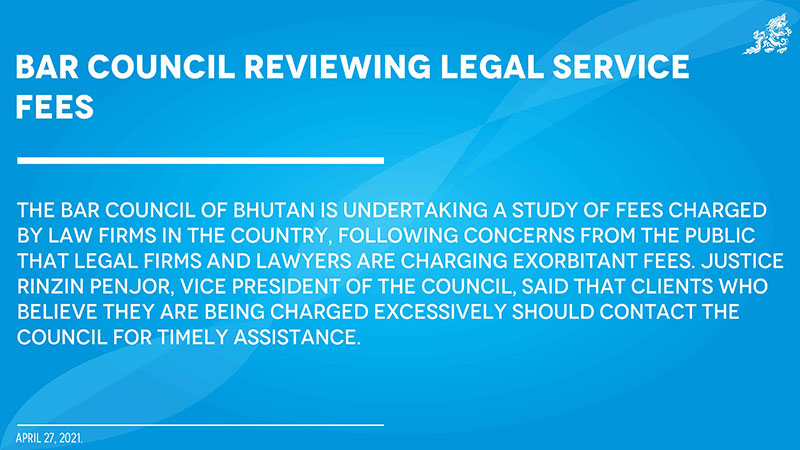Yangchen C Rinzin
Although no official complaints were lodged, the Bar Council of Bhutan is reviewing fees charged by various law firms in the country.
This, according to Council members, is because of concerns raised by people that legal firms and lawyers are charging exorbitant fee.
There are 176 private law firms providing legal services in the country today. The fees range from Nu 100,000 to 500,000 a case. In drugs-related cases, fee range from Nu 100,000 to 400,000.
Lawyers are paid higher depending on their experience and seniority.
Bar Council’s vice president, retired Justice Rinzin Penjor, said the Council does not have a mandate to fix the fees and the Jabmi (Amendment) Act of Bhutan 2016 does not mention anything on fee.
He said in some cases, clients are charged high fee when the case is not even severe because clients do not have knowledge. “Although there is no official complaint, we decided to review the fee issues.”
Rinzin Penjor said that the fee should usually depend on the capacity of the clients, the nature or severity of the case, and the record or past history of the particular legal firm.
The fee is usually fixed based on the agreement between the firm and client, which is paid either on a lumpsum or percentage-wise.
He said any clients who feel they are charged exorbitant fee could reach out to Bar Council and the Council will intervene accordingly.
The vice president said that the Council is also currently reviewing if practising lawyers should take up about two cases on pro-bono basis to indigent persons.
He said the Council is already working on the drafting of guidelines to ensure who would be eligible for pro-bono.
Some lawyers said there is no practice of fixing legal fees in the world, as it should depend on the nature of the case.
The Council’s function is also to conduct jabmi selection examinations especially for those who completed law study after July 30 2016, which is also the year Jabmi (Amendment) Act was enacted.
It also conducts examination for para-legal. “Only after passing the examination, a lawyer gets the certificate to practise. Those who want to practise as a paralegal will also require a certificate.”
Rinzin Penjor said people should take legal services of lawyers who are certified.
Although many cases go unreported, the Council is currently dealing with eight cases, where two cases are allegations of lawyers practising without certificate.
Some cases were registered in 2019 and a few were registered last year and this year. The two cases against two lawyers are not yet resolved.
Other complaints include issues with paralegals. Most of the complaints are against the paralegals for not doing their job after taking fees, some clients were not satisfied with how the cases were handled, and a few cases where the opponent have complained about the lawyer for not having paralegal certificate.
Rinzin Penjor said that in such cases, the complaint is forwarded to the disciplinary committee and all cases are being reviewed.
The Council has solved three cases so far that were related to paralegals practising without a certificate.
In one case, the paralegal was suspended to practice for a year. Two paralegals were reminded to acquire the certificate.
A member said the disciplinary committee is discussing other cases. Since members are private practising lawyers, it is difficult to meet.
There is also a case where the lawyer withdrew the case without informing the client, but claimed the appeal fees of Nu 45,000 saying that the case was appealed to the High Court. The client had no idea the case was not appealed.
Based on the severity of cases and as mandated in the Act, the committee debar or reprimand or admonish the lawyer, suspend the jabmi from practising or bar from practising. “People can walk in any time to complain if they feel deceived.”
However, there are also cases where lawyers have not received fees and clients refusing to pay the fees because the case took a long time to complete.
Roles of the Bar Council of Bhutan
The Council was established in 2017. Apart from regularising jabmis and paralegals, its functions are to encourage and promote integrity, efficiency and responsibility of jabmis on its roles.
The Council is also mandated to establish and from time to time amend a code of professional conduct for jabmis, and administer procedures for enforcement of discipline against jabmis for violation of said code of professional conduct.
The Council can also recommend the National Judicial Commission for appointment of drangpon from eminent jurists as per the Act.


